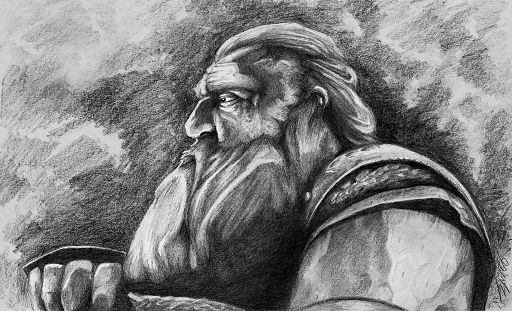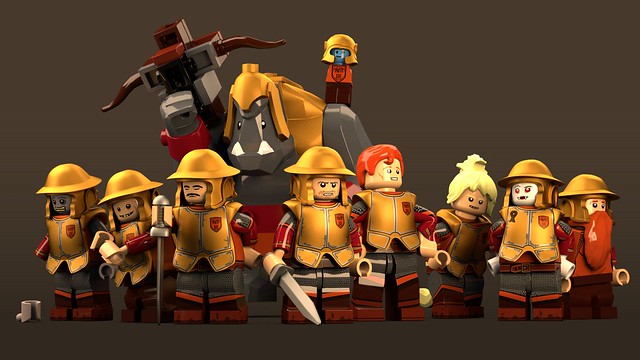More or less. Well actually, more, as when Gandalf went to visit Beorn with “a friend or two…” In historical order, as with the list of varyingly great wizards of literature.
1) Oldest of all are the seven companions of Snow White, committed to paper in the early nineteenth century. I shall not give their names, mostly because they were given no names in the tales set down by the Brothers Grimm. And also because they have been given far too many names in the many years since – see here if you don’t believe me. They seem to have been the origin of the literary convention that dwarves are miners: they “lived among the mountains, and dug and searched for gold.”

2) Next up are that very band whom Gandalf introduced to Beorn in such drawn-out fashion. Thorin Oakenshield and his twelve companions: Dori, Nori, Ori, Balin, Dwalin, Fili, Kili, Oin, Gloin, Bifur, Bofur and Bombur. They made their literary debut in 1937 in Tolkien’s The Hobbit – which next year will celebrate eighty consecutive years in print. Like their predecessors, they are keen on mining and gold. This is a point of contention with dragons, since they also like gold, and no one wants to share.
3) Trumpkin! Possibly you were expecting a certain someone from The Hobbit‘s famous sequel, but no. Tolkien’s friend Professor Lewis published Prince Caspian in 1951, thus introducing the world to this practical-minded, rather sceptical dwarf who doesn’t believe in magical talking lions and all that sort of thing – at least until he meets one. After helping Caspian claim his rightful throne, he later finds himself the de facto ruler of Narnia as Lord Regent when Caspian sails away on the Dawn Treader.

4) And now, the dwarf you’ve all been waiting for – for the last paragraph at least – Gimli son of the aforementioned Gloin. Notable as the only dwarf in the celebrated Fellowship of the Ring (in the book of that name, published 1954), he is very good with an axe. Possibly the dwarf-axe link descends from the use of pickaxes in mining; I’m not sure. Frankly, I wouldn’t want Gimli coming at me with any kind of axe, picky or otherwise, but he’s a great person to have at your back in a fight. He has one of my favourite lines from Tolkien’s whole oeuvre: “Faithless is he that says farewell when the road darkens.” Gimli doesn’t.
Gimli is also possibly the first dwarf to fall in love with an elf, since a purist would not count the fan-fictionesque flirtation of the lately inserted Tauriel with the aforementioned Kili. Gimli’s chivalrous devotion to the Lady Galadriel is made of entirely different stuff, and I must say I prefer it.

5) Hwel the playwright is a Discworld dwarf, and a rather unusual one: he doesn’t like being underground. This makes a career in mining problematic, and he instead becomes a playwright attached to Vitoller’s theatrical company. Imagine a rather smaller version of Shakespeare who has all the ideas of time and space trying to squeeze into his skull at once, and you have a fair idea of Hwel as he appears in Wyrd Sisters (1988). He knows what it’s like to be unable to get what’s into your head onto the page, and that gives me a bit of fellow-feeling for him.
6) Also in 1988 is the only non-literary dwarf on the list, Willow Ufgood, who has the distinction of being in a story named after him, and not after someone bigger, as is the usual fate of dwarves in fiction. He is the main character of the film Willow, the story for which was written by George Lucas. He is also a candidate for the list of wizards, although his magical efforts are not always successful. (Turning a troll into a gigantic two-headed fire-breathing monster is not recommended for the beginner.) As with so many dwarves on screen, he is played by Warwick Davis.

7) Cheery Littlebottom is the first openly female dwarf in the Discworld. (That’s her on the right, with the beard.) She was introduced in Feet of Clay (1996) and has since been promoted to the rank of Sergeant in the City Watch. She likes makeup and sequins and wears dresses – off duty, of course. She has also welded heels onto her uniform boots and has been known to attend functions with a little evening axe in a clutch purse. She is, after all, a dwarf.
8) Ruskin introduces himself in Diana Wynne Jones’ Year of the Griffin (2000) as “Dwarf, artisan tribe, from Central Peaks fastness, come by the virtual manumission of apostolic strength to train on behalf of the lower orders.” By which he means that he has run away from the Central Peaks mines in which his class is enslaved, in order to get wizarding training (alongside Elda the titular griffin, daughter of Derk) so that he can help his comrades overthrow the status quo under which they are being oppressed. He is, in fact, a revolutionary. And while he can trade long words with the best of them, he is by no means averse to letting a bit of the hot air out of the speech of those who oppose him.

9) Malin is, like Woodward, one of my own imagining, who has yet to see the light of publication. He likes to think of himself as a pessimist, but his actions give him the lie. He goes on fighting for his people’s freedom long after they themselves have given up, given in, and ostracized him as a troublemaker. Creative, chaotic and proud to be a thorn in the side of the powers that be, he first appears on the scene in a prison cell – a repeat engagement after his earlier escape.
There you have it – nine (or possibly twenty-seven) of my favourite literary dwarves. Feel free to add yours to the list!

Although I am not a fan of George R.R. Martin’s writing, I’m not sure your list could be considered complete without mention of Tyrion Lannister aka The Dwarf (Game of Thrones, 1996). And if Warwick Davis’s Willow counts as a dwarf, then certainly his Professor Flitwick from J.K. Rowling’s Harry Potter series (beginning with Harry Potter and the Philosopher’s Stone, in 1997) must as well.
Of course, maybe they’re not on your list because they’re not your favorites. Alas!
I didn’t include Tyrion Lannister because I didn’t think of him. Also I assumed he is not one of the dwarves of story and song, but one of the dwarfs, but someone who – unlike me – has either read the books or seen the TV series may like to correct me on that.
I did think of Professor Flitwick, though, but research indicates that he is not dwarf, but part goblin. (And goblins could be a post in themselves.)
Tyrion may be a dwarf by genetic mutation, but I think he is every bit as much a dwarf of story and song as any other. In the very long-winded series, The Song of Ice and Fire, of which Game of Thrones is the first part (currently of 5, scheduled to be 7 or 8 or 146), the fact of Tyrion’s dwarfness is integral to his character. It seems as important as his intelligence and his drinking. lol
Yes, I can see where Flitwick’s goblin ancestry would keep him from being considered a dwarf, but then I’m not sure Willow could be considered a dwarf either because neither is Warwick Davis.
Willow is a dwarf-as-in-dwarves played by Warwick Davis who is a dwarf-as-in-dwarfs, if that makes sense. So Willow makes the list, but Mr Davis wouldn’t, not even if someone wrote a song about him. (Could happen. Could already have happened.)
Re Game of Thrones “scheduled to be 7 or 8 or 146” – lol! Do you reckon Mr Martin has a bit in his will about who gets to write the rest after he shuffles off this mortal coil?
Lol! He might — in a will that begins, “Being of unsound mind and body, I hereby bequeath authorship of my unending and unholy Song of Ice and Fire series to…”
Of course you will know that the real plural of dwarf is dwarfs, but since you seem to have chosen to theme your piece around Tolkien, you have used his accidental plural “dwarves” in this piece. For only in Middle Earth and in sub-Tolkienian writing are they ‘dwarves’.
Professor Tolkien, confesses in a BBC interview (of which I have a copy on cassette tape), that he made a mistake when he began writing The Hobbit, apparently from over-generalising the f > ves plural from other words ending in f.
Anyone who knows me well is aware that I am fussy about this distinction in the plural of dwarf!
[I am unclear whether how similar historical fairy-tale dwarfs are to 20th century fantasy dwarfs]
I must comment on dwarf character plurals in other literature: DWJones pluralised Ruskin’s people as “dwarfs”, Professor Lewis did the same in Narnia for Trumpkin’s people “red dwarfs” (there are also black dwarfs, of whom Warwick Davis famously played one). Terry Practchett in Discworld, according to Wikipedia, used “dwarfs” as well.
In real life, real dwarfs are not a separate race but are people who have what Sue Ranscht calls ‘genetic mutation’. It sounds awful but it is the actual truth.
Sue, there are at least 200 forms of dwarfism, and Warwick Davis’ dwarfism is a less common one. So when he plays a dwarf, he is a dwarf-playing-a-dwarf (as opposed to when he plays an Ewok).
Aargh! I retire, covered in shame. I was under the impression that ‘dwarves’ was in use well before Prof. Tolkien’s time.
Clearly I should have done my research better: the SOD(1944) says the plural is dwarfs and makes no mention of dwarves. Actually, now I look closer, the SOD only mentions dwarfs in the sense of short human beings; no trace of mythical creatures here.
Well, can I suggest (contra Pratchett and DWJ, how dare I) that it could be of practical use to have a verbal distinction between the “separate race” of fiction and people (fictional or not) with a “genetic mutation”?
Genetic mutations producing shortness, that is. We all have genetic mutations of one sort or another. We’re just a big ol’ world full of mutants, every last one of us.
While we’re at it, let’s reintroduce the useful words “thou” and “one”! I am a mutant, thou art a mutant, one is a mutant…
Eh, no shame, it’s a good collection, regardless of the verbal distinction (or lack thereof.)
I was going to say “what about Carrot Ironfounderson?” Just out of the joy of messing with you, since he doesn’t fit either category – but he does. 😉 🙂
Yeah, I thought of him, but I didn’t want to end up having too many of the nine entries from one author. Maybe I’ll put him in a list of fictional coppers/detectives. Or long-lost heirs…